Election 1860: *SPOILER ALERT* Lincoln Wins
We all learned about this in school. Lincoln wins, the South secedes. With all the terms and dates and philosophies flying about in the preceding 20 years, how did the complicated debate over states rights, popular sovereignty, personal liberties, and slavery all boil down to one election? Here’s how.
The Contenders

The Fight
Breckinridge was a darling in the South, but held nothing in the North. Lincoln held a pretty strong majority in the North, but he wasn’t even on the ballot in the South. Realizing the election was on his shoulders, Douglas went on a nation-wide speaking tour, even into the South where he was seen as a traitor to their cause. Only by gaining cross-country support could Douglas take down the dangerous Lincoln.
At the eleventh hour, the Democratic Party sent senior party member Samuel Tilden to try to broker a fusion ticket, combining Breckinridge, Douglas, and Bell. Tilden went in to make a compromise figuring Southern Democrats cared a lot about slavery, but Northern Democrats just didn’t care. Turns out not every abolitionist ran to the Republican Party, and the surprisingly large number of anti-slavery Democrats refused to sponsor a ticket that included the ardently pro-slavery Breckinridge.
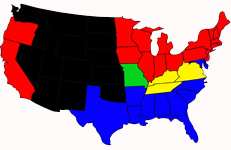 For the most part, the election results were pretty predictable. Lincoln swept the North. Breckinridge swept the South. Douglas took Missouri, which is funny because his Kansas-Nebraska Act took a big shit on the Missouri Compromise. Bell became the real spoiler, though. His anti-secession message sold the middle states, so much so in Virginia that the state permanently split over the issue.
For the most part, the election results were pretty predictable. Lincoln swept the North. Breckinridge swept the South. Douglas took Missouri, which is funny because his Kansas-Nebraska Act took a big shit on the Missouri Compromise. Bell became the real spoiler, though. His anti-secession message sold the middle states, so much so in Virginia that the state permanently split over the issue.
The Title
Lincoln won. Civil War broke out. Duh.
Douglas became an ardent anti-secessionist, going around the country stumping for Lincoln, until his death in June 1861.
The fact the Civil War happened crushed Bell’s soul, and then the War itself ravaged most of his property and business holdings.
Breckinridge fought his ass off for the Confederacy, eventually becoming Jefferson Davis’s Sec. of War. Fearing a treason conviction, he got in a tiny boat and fled.
You might be surprised to learn, though, the guy who takes us into next month, is Samuel Tilden.
Next Up – Election 1876: A Centennial Clusterfuck
The Contenders

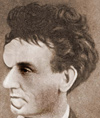 Former Congressman Abraham Lincoln (Republican-KY) – When the Kansas-Nebraska Act opened the flood gates to allow slavery in the West, the Whigs, Free Soilers, and several smaller parties all coalesced into the staunchly anti-slavery Republican Party. Their young, eloquent and vibrant candidate Lincoln was actually a moderate. He wasn’t even morally opposed to slavery, he just wanted the issue resolved, so we could focus on other pressing problems. Former Congressman Abraham Lincoln (Republican-KY) – When the Kansas-Nebraska Act opened the flood gates to allow slavery in the West, the Whigs, Free Soilers, and several smaller parties all coalesced into the staunchly anti-slavery Republican Party. Their young, eloquent and vibrant candidate Lincoln was actually a moderate. He wasn’t even morally opposed to slavery, he just wanted the issue resolved, so we could focus on other pressing problems. |
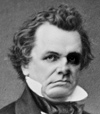 Senator Stephen A. Douglas (Democrat-VT) – Like all Democrats, Douglas, chief architect of the Kansas-Nebraska Act, saw the coming storm. If Lincoln won, the South would not tolerate him as their president. His solution laid firmly in his belief in “popular sovereignty,” that each new territory should decide their slave status on their own. Douglas represented old-school Democrats, with total devotion to liberty and populism. Senator Stephen A. Douglas (Democrat-VT) – Like all Democrats, Douglas, chief architect of the Kansas-Nebraska Act, saw the coming storm. If Lincoln won, the South would not tolerate him as their president. His solution laid firmly in his belief in “popular sovereignty,” that each new territory should decide their slave status on their own. Douglas represented old-school Democrats, with total devotion to liberty and populism. |
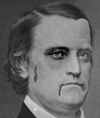 Vice President John C. Breckinridge (Democrat-KY) – At the 1860 convention, Southerners stormed out in protest when the Party refused to put federal protections for slavery on the table. After the Northern wing of the Party nominated Douglas, the South nominated Breckinridge. He believed in order to block slavery in the West, Southerners needed a federal guarantee their rights would not be taken away. Vice President John C. Breckinridge (Democrat-KY) – At the 1860 convention, Southerners stormed out in protest when the Party refused to put federal protections for slavery on the table. After the Northern wing of the Party nominated Douglas, the South nominated Breckinridge. He believed in order to block slavery in the West, Southerners needed a federal guarantee their rights would not be taken away. |
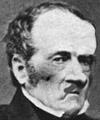 Former Senator John Bell (Constitutional Union-TN) – If Douglas was the Northern Democrat, and Breckinridge was the Southern Democrat, Bell was the border state guy. Realizing any Civil War would be fought in these states, Bell’s main goal was to keep the country out of war at all costs. Former Senator John Bell (Constitutional Union-TN) – If Douglas was the Northern Democrat, and Breckinridge was the Southern Democrat, Bell was the border state guy. Realizing any Civil War would be fought in these states, Bell’s main goal was to keep the country out of war at all costs. |
The Fight
Breckinridge was a darling in the South, but held nothing in the North. Lincoln held a pretty strong majority in the North, but he wasn’t even on the ballot in the South. Realizing the election was on his shoulders, Douglas went on a nation-wide speaking tour, even into the South where he was seen as a traitor to their cause. Only by gaining cross-country support could Douglas take down the dangerous Lincoln.
At the eleventh hour, the Democratic Party sent senior party member Samuel Tilden to try to broker a fusion ticket, combining Breckinridge, Douglas, and Bell. Tilden went in to make a compromise figuring Southern Democrats cared a lot about slavery, but Northern Democrats just didn’t care. Turns out not every abolitionist ran to the Republican Party, and the surprisingly large number of anti-slavery Democrats refused to sponsor a ticket that included the ardently pro-slavery Breckinridge.
 For the most part, the election results were pretty predictable. Lincoln swept the North. Breckinridge swept the South. Douglas took Missouri, which is funny because his Kansas-Nebraska Act took a big shit on the Missouri Compromise. Bell became the real spoiler, though. His anti-secession message sold the middle states, so much so in Virginia that the state permanently split over the issue.
For the most part, the election results were pretty predictable. Lincoln swept the North. Breckinridge swept the South. Douglas took Missouri, which is funny because his Kansas-Nebraska Act took a big shit on the Missouri Compromise. Bell became the real spoiler, though. His anti-secession message sold the middle states, so much so in Virginia that the state permanently split over the issue.The Title
Lincoln won. Civil War broke out. Duh.
Douglas became an ardent anti-secessionist, going around the country stumping for Lincoln, until his death in June 1861.
The fact the Civil War happened crushed Bell’s soul, and then the War itself ravaged most of his property and business holdings.
Breckinridge fought his ass off for the Confederacy, eventually becoming Jefferson Davis’s Sec. of War. Fearing a treason conviction, he got in a tiny boat and fled.
You might be surprised to learn, though, the guy who takes us into next month, is Samuel Tilden.
Next Up – Election 1876: A Centennial Clusterfuck
Labels: elections, presidents





 This blog is not to be taken seriously. Seriously. I take this seriously, but you shouldn't. You should do what you want, but you'll probably enjoy this more if you don't take anything I say seriously. I mean, I mean what I say, but it's not serious. Oh also, swearing is hilarious. It shouldn't be, but it is.
This blog is not to be taken seriously. Seriously. I take this seriously, but you shouldn't. You should do what you want, but you'll probably enjoy this more if you don't take anything I say seriously. I mean, I mean what I say, but it's not serious. Oh also, swearing is hilarious. It shouldn't be, but it is.


0 Comments:
Post a Comment
Subscribe to Post Comments [Atom]
<< Home